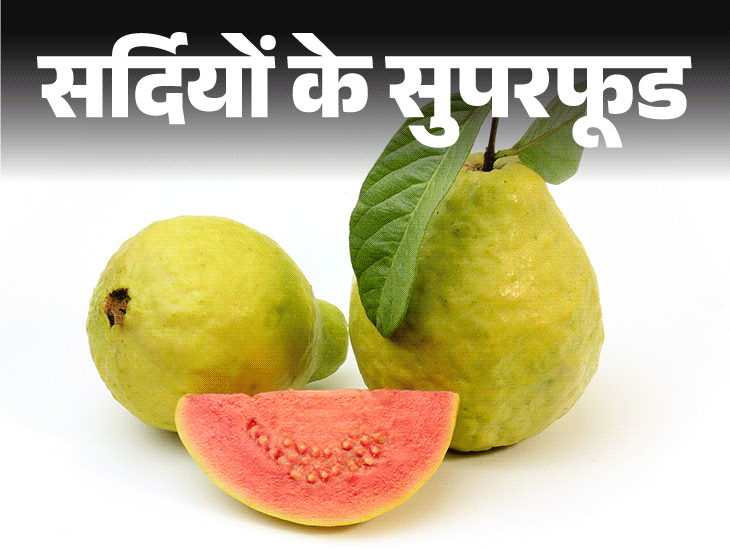India News Get -LifestyleHealth Benefits of Guava; Amrud Nutrition Facts, Precautions | Winter superfood
“Winter superfood” Today’s food in the series is guava.
If you are asked to list a few winter fruits, guava will obviously be included as well. Did you know that this very simple-looking fruit is a winter superfood.
The particularity is that the guava tree grows in warm regions and its fruits arrive during rainy and cold seasons. It was originally grown in warm regions of South America. Then, around the 17th century, the Portuguese introduced it to India.
Guava has a sweet and crunchy taste. It is a treasure of taste but also of health. In Ayurveda, its fruits and leaves are considered very useful. In many countries, including India and China, people still prepare tea from guava leaves and drink it for stomach upset.
Guava pulp is traditionally used to heal wounds in many countries such as Mexico. Apart from this, it is also very beneficial against menstrual cramps and diabetes.
This is why today we will talk about guava in the “Winter Superfoods” series. You will also learn that-
What is the nutritional value of guava? Eating it reduces the risk of which diseases? When and who should not eat it?
What is the nutritional value of guava?
Like any superfood, guava is also a very low-calorie and high nutritional density fruit. It contains very little fat. Contains mainly carbohydrates and fiber. Apart from this, what other foods are available, see in the chart:
Guava is rich in vitamins and minerals
The special thing about guava is that, despite its sweet taste, it is rich in vitamin C. Just 100 grams of guava provides 380% of the daily requirement of vitamin C. Apart from this, it also contains important minerals like magnesium and potassium. See the graph:
Guava is very beneficial for health
Vitamins A, B and C are present in guava. It contains important nutrients like fiber and antioxidants. It is therefore very beneficial for gastrointestinal health. This strengthens the immune system and helps in weight management. Eating guava daily makes the skin healthy and glowing. What are its other advantages, see in the chart:
Some Common Questions Related to Guava and Their Answers
Question: How many guavas can you eat per day?
Answer: It is safe for a healthy person to eat 1-2 guavas per day. Its nutritional value is high. So it can be a healthy snack. However, eating too many guavas at once can cause constipation or indigestion and stomach cramps. Eating too much guava can also increase blood sugar levels. So consume it in limited quantities only.
Question: Why is it forbidden to eat guava in the evening?
Answer: According to Ayurveda, guava has a cooling effect. It is therefore forbidden to eat it in the evening. It can cause colds and coughs. It is therefore advisable to eat guava during the day.
Question: Can people with diabetes eat guava?
Answer: Yes, you can definitely eat it. Guava has a low glycemic index. Guava is therefore a good fruit for people with diabetes.
Despite this, if a diabetic person includes it in their diet, it is important to monitor their blood sugar levels regularly. In fact, 100 grams of guava contains around 9 grams of natural sugar. Eating too much guava can increase blood sugar levels.
Question: Can people with irritable bowel syndrome eat guava?
Answer: Yes, you can definitely eat it. Guava is rich in fiber. Therefore, it eliminates the problem of constipation and aids digestion.
However, eating too much guava can cause diarrhea. Especially if someone suffers from irritable bowel syndrome, eating guava can cause stomach upset. Therefore, eat guava only in limited quantities.
Question: What are the side effects of guava?
Answer: Guava generally has no side effects. However, eating too much guava can cause constipation and digestive problems.
It has been repeatedly observed that chemicals used to preserve fruits for a long time also cause health problems. Therefore, before eating guava, it should be washed thoroughly and eaten.
Question: Who should not eat guava?
Answer: Guava is a safe fruit for most people. However, some people should avoid including it in their diet.
Those with skin allergies: The chemicals found in guava can cause skin irritation in some cases. This problem mainly occurs in people who already have skin problems like eczema. Therefore, if you have skin problems, you should avoid eating guava. This could make the situation worse.
Question: Can eating guava cause stones?
Answer: Yes, eating guava can cause kidney stones. Guava, brinjal, tomato and ladyfinger seeds can cause kidney stones. People who have previously had kidney problems should eat less guava. If you have kidney stones, seek expert advice before eating guava.
Question: Does eating guava cause flatulence?
Answer: Guava is rich in vitamin C and fructose. Both nutrients can cause bloating. Therefore, eating too much guava leads to flatulence.
A large number of people in India suffer from the problem of fructose malabsorption. In this, our body is not able to absorb natural sugar. This sugar stays in the stomach and causes bloating. People who often have bloating problems should avoid eating guava.
………………………….. from the winter superfoods series 1. Winter superfoods – Amla in winter 12 reasons to eat: considered a nectar in Ayurveda
In Ayurveda, Amla juice is considered to be a chemical that can prevent aging. It is such a beneficial fruit that Ayurveda calls it a gift of nature. … 2. Winter superfood – 12 benefits of eating an orange every day: Protects against cancer and kidney stones.
Orange is an excellent source of vitamin C. Its consumption strengthens the immune system and also helps in the absorption of iron. It contains a lot of dietary fiber, potassium and folate. …

